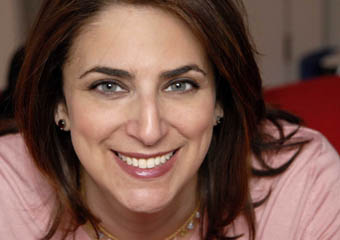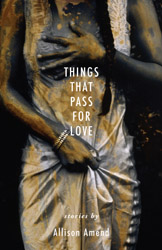Things That Pass for Love
Permanent link All Posts

Allison Amend talks about love, writing, and being a Jew
In Allison Amend’s debut collection of short stories, Things That Pass for Love, (OV Books), released this week, no matter how far removed the character is from the author, there’s a little bit of Allison in everyone she writes about.
The early-30-something, Chicago-born Jewish author introduces her readers to a world of unusual characters who are funny, quirky, lonely and real. They include an urban school teacher who is converting to Judaism, a cyber erotica writer whose suitor is in love with his dog, a father meeting his illegitimate son for the first time on a pumpkin-picking outing, and a young American Jewish woman sharing Shabbat dinner with an Orthodox family in France. Her characters are all seeking love in some form, but are settling for what “passes for love.” Amend, who now lives in New York City, was raised in a strong Jewish household in Lincoln Park. She attended Stanford University, holds an MFA from the Iowa Writers’ Workshop and has taught high school English on a Fulbright Fellowship in Lyon, France.
I spoke with Amend while she was in town touring in support of the book. We discussed the theme of her collection, her inspirations and why she thinks emerging writers ought to consider a career in accounting.

Things That Pass For Love
Why did you want to release a collection of short stories?
I’ve always been interested in writing stories, since the first grade. When I went to graduate school in Iowa, they have a workshop system and short stories are much easier to workshop than novels because they are contained and people can discuss your story as a whole. I’ve also always been interested in writing short stories because it’s nice to have a project that gets finished as opposed to my novels; those take me five to eight years to write. I’ve been working on short stories around the novels I’ve been working on. Also, I like the sparseness of a short story, the essentials. You cut away everything you don’t need. My throw-away-to-keep ratio is about 4 to 1.
Would asking you to pick your favorite story be like asking you to pick your favorite child?
I’m most fond of the stories that I’ve written most recently, which makes sense because I’m less sick of them. Some of the stories I wrote a while ago remind me of a less evolved version of myself. It’s hard to look at them because it reminds me of being 27 or whatever.
The voices of each story are so varied. How do you write like so many different types of people?
What I enjoy about writing is that I find it’s like playing dress up. You get to try on a whole bunch of different people’s clothing. For me, part of the joy is to see who these people are, people who are very different from me. Today, I’m a Vietnam veteran, the next day I’m a philandering middle-aged husband.
Is there a theme that connects these disparate stories, and where does the title come from?
Finding a title was a really long process. I felt that there was something very subtle and almost indescribable that was connecting these stories. They feel connected to me, but they’re not necessarily thematically linked. My editor and I were trying to find a title that expresses that and I think we did. These stories are about people looking for love, not necessarily romantic love, but love between a pet and its owner, love between a parent and a child, love between siblings and there are certainly romantic relationships explored in the collection. [Non-romantic relationships] are under-explored in contemporary literature and in literature in general. These characters are looking for those connections, but then what they end up settling for is what “passes for love” between them, and is that enough?”
How much of you is in each character?
There has to be a part of an author in each character even in the sense that that is how the character goes about his/her daily business…They are certainly inspired by situations I’ve thought about, been in, or seen, and they all come from my brain so they’re all semi-autobiographical. They are smart and able to make fun of themselves in a lot of ways, which is how I approach life.
Some of the stories are more autobiographical than others. The story “Good Shabbos,” has an overtly Jewish theme, and is almost verbatim what happened to me. I was on a Fulbright teaching fellowship in Lyon, France. One of my students invited me to Chanukah dinner, but in the story, he invites me for Shabbat dinner. I had thought the student was Muslim, but he was Sephardic. He had a last name that wasn’t a German Russian last name like I was used to. I was a little homesick and thought it would be fun and I would fit in. Their experience of Judaism was so radically different from mine, and I didn’t feel like I was in my family’s home for dinner at all. I realized how different their experience was from mine is, but it was still a shared experience. Everything was foreign, [including] the food and the songs. [Growing up], my biggest Jewish adversity was having to go to Hebrew School on Sundays and not getting to sleep in, while theirs was literally having to hide from the Nazis. Yet, there was still something shared there.
What impact does being Jewish have on you as a writer?
I hope I come from the strong tradition of Jewish writers. I really admire Philip Roth, Saul Bellow, and Cynthia Ozick. With a lot of the stories in my collection—even if they don’t have overtly Jewish content—the characters in my brain are Jewish. Sometimes, the characters are not Jewish, in that they are the exact opposite of Jewish. I’ve also worked on two unpublished novels. One is about Jewish immigrants in Oklahoma in the 1800s, based very loosely on my mother’s family, and the other novel is about a Jewish woman who is a single mother in Chicago, who is coincidentally Jewish. The Oklahoma one is very much about what it means to be a Jewish immigrant and how to develop a relationship with religion when you’re considering assimilation.
What sort of Jewish background do you have?
I don’t feel a strong religious connection, but I feel an incredibly strong ethnic and cultural connection. I’m very glad that I have received a Jewish education, because it is great to have a spiritual background and you can choose to adopt that background or not. But if you don’t have it, you don’t have that choice. What is amazing about Judaism as a religion or ethnicity is that learning about Judaism is learning about history of civilization. Also, it gives you a connection to people all over the world.
Who inspires you in your writing?
I read voraciously, as most writers do, and very quickly. Pretty much when the book is done it’s out of my brain and I’m on to the next one. I’m very influenced by what I happen to be reading at the time. Also, I read a lot of emerging fiction writers, what my contemporaries are writing. I find my friends’ books incredibly inspirational. Most recently, I read Curtis Sittenfeld, who went to [school] with me, and Sarah Shun-Lien Bynum. Occasionally, I’ll discover things for the first time. I discovered Saul Bellow a couple of years ago. It was brilliant and I thought, why didn’t anyone tell me to read this?
What advice do you have for burgeoning writers?
My cynical advice would be to get a degree in accounting. Now, it’s becoming increasingly clear to me that I’m not going to be able to make a living off of writing and I think you need to be lucky to do that.
My other advice is to persevere. You can’t take it as a message from anyone if you get rejected from something. There are so many factors that determine that. It depends on who’s reading it, when they’re reading it, what else is being published at that time. I’ve learned from publishing that some times good books sell, some times bad books sell, some times good books don’t sell, and some times bad books don’t sell.
For more information, visit
www.allisonamend.com
.



.jpg)



